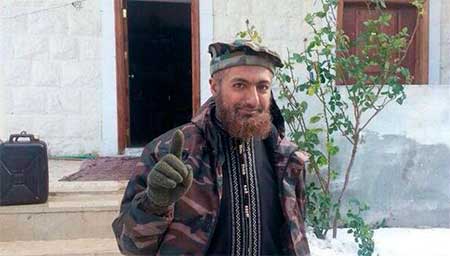
Ibrahim Bin Shakaran, a Moroccan who spent more than three years at the Guantanamo Bay detention facility before being released to Moroccan custody, has been killed while leading a jihadist group that fights Syrian government forces.
Bin Shakaran, who is also known as Abu Ahmad al Maghribi, Abu Ahmad al Muhajir, and Brahim Benchekroune, was "martyred, Insha'Allah, in battles for Hilltop # 45 in Latakia," according to Kavkaz Center, a propaganda arm of the Islamic Caucasus Emirate.
Bin Shakaran led a jihadist group known as Sham al Islam, which is based in Latakia and is comprised primarily of fighters from Morocco, according to the Washington Institute for Near East Policy. Bin Shakaran created the group "not only to recruit fighters for the Syria war, but also to establish a jihadist organization within Morocco itself."
Sham al Islam has been fighting alongside the al Qaeda's Syrian branch, the Al Nusrah Front for the People of the Levant, as well as Ahrar al Sham and the Army of the Emigrants and Supporters in an ongoing offensive in the coastal province of Latakia.
Sham al Islam was one of several rebel groups that fought in another offensive in Latakia in August 2013 in which major human rights abuses were committed. While Human Rights Watch noted that Sham al Islam was present during the offensive, it could not confirm if the group was involved in the atrocities committed. The group's allies, the Al Nusrah Front, the Islamic State of Iraq and the Sham, Ahrar al Sham, Jaish al Muhajireen wal Ansar (or Army of Emigrants and Helpers), and Suquor al Izz, were directly implicated. [See Report highlights al Qaeda affiliates' role in Syrian atrocities, from LWJ.]
Bin Shakaran is the second former Guantanamo Bay detainee from Morocco reported to have been killed in Syria while waging jihad for Sham al Islam. The other ex-Guantanamo detainee, who was known as Mohammed al 'Alami, was killed last year.
A December 2003 leaked threat assessment authored by Joint Task Force Guantanamo (JTF-GTMO) identified Bin Shakaran as a "high-ranking member" of the theological commission of the Moroccan Islamic Combatant Group, an al Qaeda-affiliated terrorist organization. According to the assessment, he traveled to Afghanistan in November 2000, "attended basic and advanced training at the Al Farouq training camp," a known al Qaeda facility, "from January to May 2001," and then "rotated to the front lines near Kabul" in October 2001 after the US invaded Afghanistan.
Bin Shakaran fled Afghanistan as US forces pressed al Qaeda. He passed through the Afghan province of Logar, then to Pakistan's Waziristan tribal area, then to Bannu, and after that to Lahore with "two Pakistanis, three Arabs and a Turkmenistani."
The 2003 JTF-GTMO threat assessment recommended that Bin Shakaran remain in custody as he "poses a high risk as he is likely to pose a threat against the US, its interests, or her allies."
Despite the assessment, the US transferred Bin Shakaran to Moroccan custody in July 2004, and he was released shortly afterward by Moroccan authorities.
Bin Shakaran immediately returned to the fight. The Defense Department reported in 2008 that Bin Shakaran and another freed Guantanamo detainee known as Mohammed Bin Ahmad Mizouz were involved "in a terrorist network recruiting Moroccans to fight for Abu Musab al Zarqawi's al Qaeda in Iraq." Zarqawi's group was responsible for killing and wounding thousands of US soldiers in Iraq.
"Recruits were to receive weapons and explosives training in Algeria from the Salafist Group for Preaching and Combat, which has since become al Qaeda in the Lands of the Maghreb [al Qaeda in the Islamic Maghreb], before going to fight in Iraq or returning to Morocco as sleeper cells," the Defense Department noted.
Moroccan security forces arrested Bin Shakaran, Mizouz, and other members of the cell. Both men were convicted in 2007 for their roles in the terror recruitment cell; Bin Shakaran received a 10-year sentence and Mizouz only two years.
Bin Shakaran served only six years of his 10-year prison sentence. Shortly after being freed from a Moroccan prison, he was killed while waging jihad alongside al Qaeda and its allies in Syria.